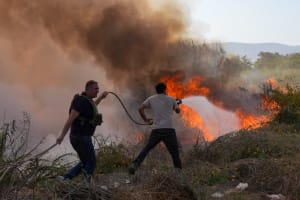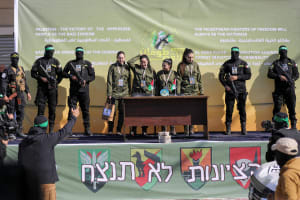My traumatic yet joyous homecoming to Israel

Coming home to Israel after a trip overseas to anywhere, for any length of time, is always emotional.
Choking back tears, in a matter of minutes I see the coast, cities with countless construction sites indicating growth and building for the future, low-lying houses and buildings surrounded by fertile cultivated fields. I anticipate seeing my family and sleeping in my own bed. Touchdown is often greeted with applause. I’ve never landed at any other airport where so many people applaud and get emotional. I’m home.
Emotions continue minutes later walking down the ramp to passport control and baggage claim, past pictures of the 134 hostages still in captivity by Hamas in Gaza, the same 134 people whose pictures I walked by, slowly, still in captivity when I left weeks earlier.
The lump in my throat got bigger and it became harder to breathe. The trauma of being home, to a country at war, returns full force.
Suddenly I realize that the line between the joy of being home and the trauma at home is very narrow. As much as I am thrilled to be home, returning to the trauma is strangely comforting. I’ve missed it traveling through two countries and 11 states, in more than a dozen hotels. I’ve even felt guilty being away, an undeserved respite, despite the fact that every day is spent thinking and talking about the situation, often intensely and emotionally.
The trauma continued upon leaving the airport as I learned of a serious security incident involving snipers. While security incidents in Israel are not unusual, snipers at the airport are rare indeed. Welcome home to the trauma. Now, I just want to get home to my house.
The next day is the first Friday of Ramadan. After 20 years, we’ve learned that as much as Ramadan may be the Islamic holy month, it is often used as a catalyst or excuse for terrorism and violence. Precautions have been made to limit the threats, but living adjacent to a Palestinian Arab village whose mosque is often louder than my TV, we also know to be on the lookout and careful about incidents that could happen at any moment.
That evening, after the sanctity of the beginning of Shabbat descended on Israel, the day of rest, I was reminded how close everything is. We live some 40 miles northeast of Gaza. During the course of the war, it has not been unusual for rockets to be fired this far, sending us to our bomb shelter, multiple times until the sound of the Iron Dome intercepting the rocket overhead.
It’s such a narrow country that whether en route to attacking a terrorist site in Gaza, or having just done so, we often hear the thunderous sound of military aircraft overhead. This was the first time I had heard these since coming home, but still, they sounded unusually loud. My family looked at one another aware that the quantity of airplanes overhead sounded unusually large, wondering what they were doing or had just done.
Another momentary awareness of the reality of the trauma around us, even at 34,000 feet. Nevertheless, it is a comfort to be home, aware that despite the war there’s no shortage of hardware to protect us.
Speaking with friends and family, I also became aware that while many have been discharged from active military service, the trauma they experienced was not left behind. It still impacts Israelis daily. While traveling, I spoke of how the war and its consequences will impact the DNA of our souls. I visited a college professor who has been concerned for my family from the start of the war. He reminded me that it’s a real phenomenon (which I knew), but I didn’t know it had a name. Epigenetics.
I wish I could be alive 50 years from now to study the history of this time, but also to see how my children and grandchildren grow up, hopefully thriving as adults and parents and grandparents themselves. I hope they are able to put the trauma of this war in perspective and succeed on every level personally, as well as continuing to build our country. We are all deeply impacted in our souls. This, sadly, will probably not go away anytime soon.
The trauma is not just personal but national. I don’t know how yet, but it will impact everything going forward in the future of the State of Israel and Jewish history. It will impact how we look at ourselves, how we defend ourselves, the risks we’re willing to take, our economy, international relations, who our friends really are, and much more.
There’s trauma in international calls and pressure for a cease-fire that takes into account only the alleged civilian casualties among Gazans (based on the undocumented and conflated Hamas numbers), with no parallel calls for a release of all the 134 hostages, dead and alive, or the urgency to eradicate Hamas, Hezbollah, and the Iranian Islamic regime that is the head of the evil snake, and where regime change must begin.
There’s profound trauma amid painful negotiations for a hostage release. One hundred and thirty-four people still being held by the terrorists. It’s unthinkable that anyone would think that taking hostages is acceptable to begin with, or that we would have to negotiate and release hardcore terrorists to get them back, as if some sort of corporate business deal.
For weeks there’s been talk of releasing 40 or 50 hostages, but this brings to the forefront the awareness of the trauma we know they have suffered, how to help them when they are freed, and the psychological warfare that the terrorists inflicted, cruelly manipulating us in December as 101 hostages were released. No doubt this will be the same if a new deal is secured, if not worse, traumatizing us all.
There’s added trauma that we feel indirectly through the families of the hostages. If 40-50 are released, that means most will not be, leaving unbearable suffering for the families of those remaining in captivity.
The trauma is heightened further by the horrific and yet possibly necessary release of terrorists in exchange for the hostages, including murderers. The suffering of the families of their victims, where they will be released to, and when they will commit more acts of terror are just some of the things that traumatize us as a nation.
There’s no end to the trauma in sight, but what is always a constant is that even with the war and the trauma, it’s a blessing to be home, personally and prophetically.

Jonathan Feldstein was born and educated in the U.S. and immigrated to Israel in 2004. He is married and the father of six. Throughout his life and career, he has become a respected bridge between Jews and Christians and serves as president of the Genesis 123 Foundation. He writes regularly on major Christian websites about Israel and shares experiences of living as an Orthodox Jew in Israel. He is host of the popular Inspiration from Zion podcast. He can be reached at [email protected].













